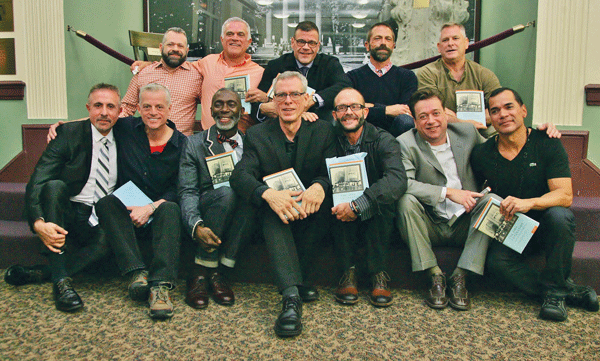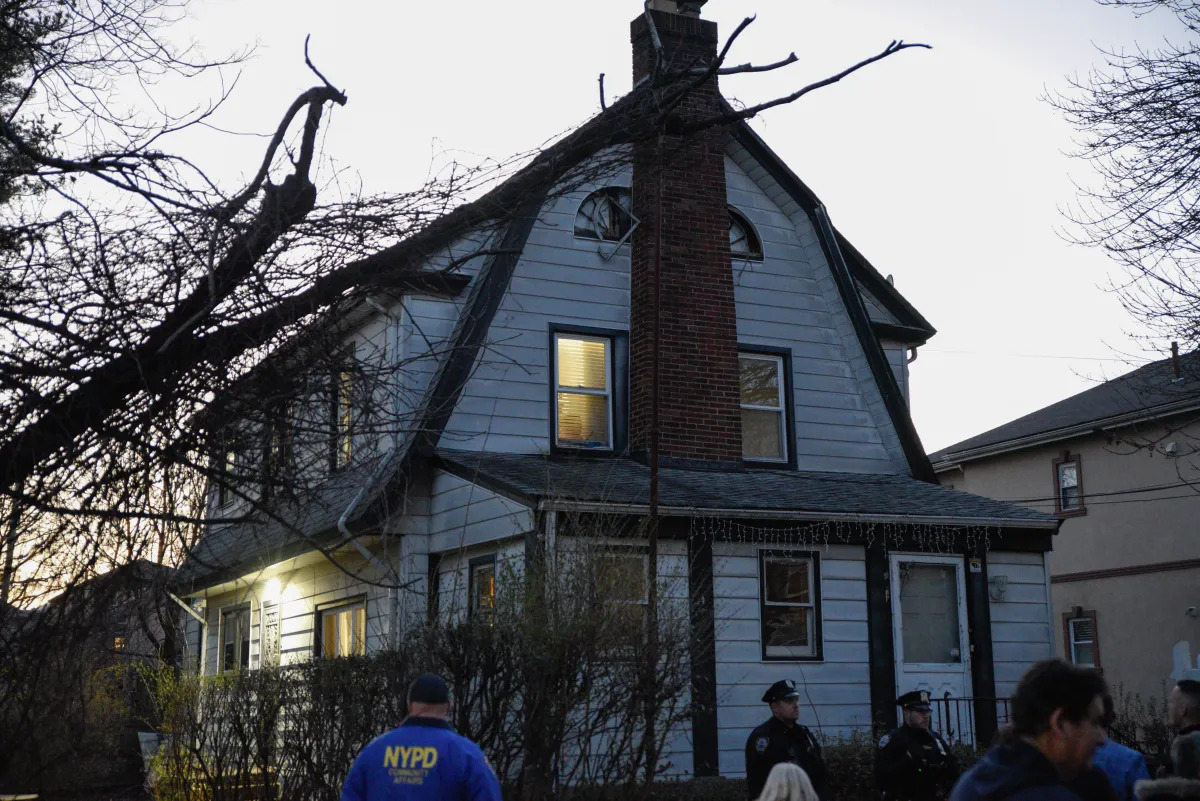
Perry N. Halkitis, at bottom left, joined some of the men he interviewed for “The AIDS Generation: Stories of Survival and Resilience.”

“AIDS Generation” author Halkitis is challenging his contemporaries to use their experience to benefit the PrEP generation.
BY PERRY N. HALKITIS, PhD, MS, MPH | Writing “The AIDS Generation: Stories of Survival and Resilience” has changed my life. It has done so in the obvious ways, namely the attention placed on the book, the numerous talks and presentations I have given throughout the country, the accolades associated with this work, and the development of a documentary inspired by the book. This book has also contributed to an ever-growing and powerful body of work honoring the early days of AIDS.
Since the book was published last fall, my journeys have taken me from Los Angeles to Austin, Baltimore, and beyond — and in my own hometown, from GMHC and SAGE to the LGBT Center and the amazing Lower East Side bookstore, Bureau of General Services — Queer Division. During my many travels, I have been asked why so much attention is being placed on the early days of AIDS at this particular moment in time.
I believe several factors explain this reemergence of the AIDS generation. First, we all took a necessary breather when the course of the epidemic was radically changed in 1996. After years of battling the virus as well as the stigma and discrimination and shortsightedness of our society at the onset of the AIDS crisis, we needed to grieve and regroup. We also were a little cautious with our treatment optimism, not so certain these new antiviral regimens would actually work. Would it just be matter of time before havoc and chaos and unbridled death returned?
As we attempted to reconcile our grief and trauma, in both proactive and avoidant ways, it became clear that that these HIV medications were, for the most part, going to work for extended periods of time. And indeed, here we are, as older adults, ready to tell our stories. Middle age is, in fact, a time to make sense of one’s life and one’s place in the world. In doing so, thoughts of accomplishments and legacy emerge.
It is perhaps in this reflection that we have come to realize that what we had accomplished as a generation is truly remarkable — a story of passion, bravery, and resilience. Despite the losses, which are too many to enumerate, we as a generation of gay men have overcome cataclysmic events to find ourselves as the elder statesmen in our population.
With this realization comes an obligation to document those early days as a testament to our actions and to those we lost, as a statement of our collective resilience, and as a tome to eternally document that period of time to inform and educate future generations. It is the action and courage of our generation and those who preceded us (a group I refer to as the Stonewall generation) that laid the foundation for so many of the social and civil rights victories our population is beginning to experience.
We also have an obligation to help those who are beginning their lives as young gay men, both HIV-positive and negative, perhaps easing this period of time as they find their places in the world, by sharing our wisdom on how to fight this horrible disease that continues to plague us.
This book has changed my life, and it has also for so many of the beautiful men whose stories are shared in those pages. These men who now have become my friends have also been transformed over the course of the last two years. The group meets regularly for lunch and dinners, and a Facebook page, The AIDS Generation Veterans Association, was launched by Sean McKenna, one of the amazing men I have come to know.
I recently spoke to several of the men depicted in “The AIDS Generation” about this article to assess their understandings. (The men have agreed to be revealed by their actual names rather than the pseudonyms assigned in the book).
Jimmy Mack, now 57 years old, who has written about the growing interest in the AIDS Generation in his blog (on TheBody.com), said that the book “hailed the beginning of a renewed interest in the AIDS Generation as witnessed by the Broadway hit ‘Mothers and Sons,’ the documentary film ‘How to Survive a Plague,’ and the HBO movie ‘The Normal Heart.’ ” This renewed interest is not simply within the general public but also among those within our social circles, as noted in the words of Jimmy’s husband, Brian Mott. A New York City school teacher, now age 49, Mott said, “The friends of mine who read the book, who perhaps knew the outline of my story, were very clear that they gained a deeper understanding and appreciation of the emotional turmoil of an HIV infection in that time in history. One of them even said something along the lines of, ‘I wonder how I might have been complicit in the stigma and the fear that was going around back then.’ ”
Sean McKenna, 51, who has been right by my side intellectually, emotionally, and physically during this entire journey, has been vehement on numerous occasions in what being part of this project has meant for him. “It has brought me back to life by showing me there are others just like me. It took me out of my isolation and depression and made me happy again. I am now much more active and much more of an activist. It’s given me a reason to keep spreading the word about HIV/AIDS in a very positive way. It gave me my life back.”
Jon Deleon, now age 55, who has been on a tour around the world this last few months (I have been following his travels on Facebook), said about his involvement in the project, “I’ve enjoyed a much greater sense of pride within my self. The book has helped me see heroic things in myself and others of the AIDS Generation.”
And my wonderful friend Jason Osher, age 43, whom I met at GMHC in 1996 (and with whom I will be seeing Fleetwood Mac on October 6), described it as follows: “Being a part of the book project has definitely given me a sense a community among my HIV positive brothers. I knew few people living with HIV/AIDS who I regularly interacted with and this group has offered a built-in source of support from those who understand the issues we share.” (I think both Jason and I are grateful and amazed to be seeing the Mac in 2014 when it wasn’t clear we would live to see them again after our last concert together in 1997.)
In part because of this book, many of us have found each other. Grassroots efforts are emerging throughout the country, support groups for poz men over 50 have been delivered at Friends in Deed, one of which I had the honor of facilitating this last month with my friend and colleague, Scott Kramer. GMHC, an agency that for years stood at the forefront in the fight against AIDS, is paying attention to us, having invited me and the men of “The AIDS Generation” to help the agency think through the programming that we most need.
It is my hope that these and other similar conversations will help spur discussions and understandings that HIV is not simply a biomedical condition (a very limited conception that so many on the medical professionals have espoused in the last two decades), but rather a disease that is driven as much by social, structural, and psychological states as it is the actual biological transmission of a pathogen.
THE GREAT PrEP WARS
All of this activity is occurring at a time when we have a new and promising tool to fight HIV, namely PrEP [Pre-Exposure Prophylaxis; a daily regimen, in pill form, meant to prevent HIV infection]. PrEP is indeed an excellent weapon in our arsenal — but perhaps as powerful is the guidance, support, and compassion the men of the AIDS generation can provide to a new generation of gay men. We, who came of age while the AIDS epidemic was emerging, must use our understanding and support to bolster the uptake and effectiveness of new prevention approaches, like PrEP.
Recently we all were subjected to the ill-informed and hateful comments of Michael Weinstein and Larry Karmer about PrEP. (Kramer, who wrote “The Normal Heart,” told The New York Times, “There’s something, to me, cowardly about taking Truvada instead of using a condom. You’re taking a drug that is poison to you, and it has lessened your energy to fight, to get involved, to do anything” — while Weinstein, president of AIDS Healthcare Foundation, was quoted by the Associated Press as saying, “If something comes along that’s better than condoms, I’m all for it, but Truvada is not that. Let’s be honest: It’s a party drug.”)
It is important to note that these men do not represent sole voices of our generation. In fact, the men of “The AIDS Generation” had a very different take on PrEP than both Weinstein and Kramer. “That controversy has taken over, and it’s a shame. Any weapon in the arsenal against HIV/AIDS is okay by me,” said McKenna. And the much-acclaimed musician depicted in the book, Steve Schalchlin, now 60 years old, said, “I think sometimes older people are weighed down by history and can’t see the world through younger eyes. They’ve forgotten how intimate unprotected sex can be in a relationship. I hate to see people taking these meds, but I would rather they take it without AIDS than have to take it because they have AIDS.”
In the last few months, I have wondered if the attitudes of men like Weinstein and Kramer are rooted in anger and resentment, an idea that Mott eludes to, albeit it in a healthy and loving way, when he says, “As for younger men using PrEP, my strongest feeling is one of regret for myself. I certainly would have used it had it been available back then. So I say more power to them.” In fact, we all likely would seek PrEP, and hope not to be judged, if we were young HIV-negative men, as Jim Alba, a super-fit personal trainer, now age 53, shared with me. “I have one thing to say about the PrEP finger-pointing. I know, through conversations with my closest survivor brothers, had we been offered this choice back then, [1984,1985,1986], we would have been first in line.”
I too am grateful as I witness a new generation of gay men that has additional tools to fight this virus — a generation that is coming of age when marriage equality is blossoming, and a generation that is being raised by parents like my cousin Ellaina who simply loves her newly out gay son, James — no questions, no judgment, just love.
And so as we, the men of the AIDS generation continue our life journeys, our roles as elder statesmen continues to become increasingly important. We must allow our insights and our compassion help guide the lives of new generation of gay men, share our knowledge and experiences whenever possible, share our thoughts without judging, and muffle the cacophony of Weinstein and Kramer.
On June 2, I attended the Lambda Literary Awards, where my book was nominated in the memoir/biography category. I didn’t win, but the evening was one of revelation. As I navigated the space with my always-exquisite looking husband Bobby, I found myself surrounded by a new generation of dressed-down, hipster, gender-bending gay men. (We, of course, were well-groomed, dressed in our finest suits, and lathered in our hypermasculinity.) I smiled as I considered the differences across the generations and how much has changed since I was twentysomething. I reflected on the losses and the pain and the bravery of my generation. I also came to understand that in getting older, there is no need for me to be more that what I am — no need to emulate or judge a new generation — but just be myself, serve as a role model, and be happy that I am “vintage gay.”
Perry N. Halkitis, PhD, MS, MPH is Professor of Applied Psychology, Public Health, & Medicine, Director of the Center for Health, Identity, Behavior & Prevention Studies at New York University, and author of “The AIDS Generation: Strategies for Survival and Resilience” (Oxford University Press, 2013). Visit perrynhalkitis.com. Twitter: @DrPNHalkitis.

















